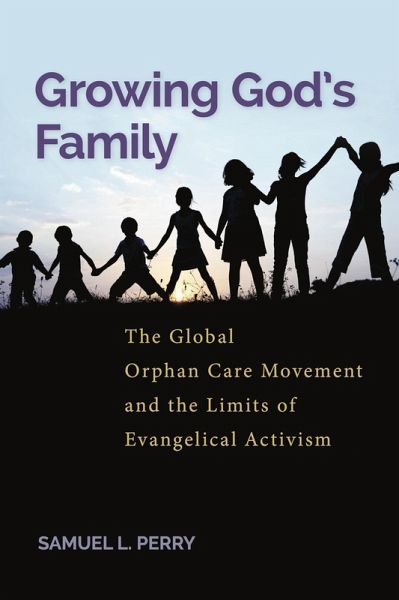
Growing God's Family (eBook, ePUB)
The Global Orphan Care Movement and the Limits of Evangelical Activism

PAYBACK Punkte
12 °P sammeln!
Illustrates the hidden challenges embedded within the evangelical adoption movement. For over a decade, prominent leaders and organizations among American Evangelicals have spent a substantial amount of time and money in an effort to address what they believe to be the Orphan Crisis of the United States. Yet, despite an expansive commitment of resources, there is no reliable evidence that these efforts have been successful. Adoptions are declining across the board, and both foster parenting and foster-adoptions remain steady. Why have evangelical mobilization efforts been so ineffective?To ans...
Illustrates the hidden challenges embedded within the evangelical adoption movement.
For over a decade, prominent leaders and organizations among American Evangelicals have spent a substantial amount of time and money in an effort to address what they believe to be the Orphan Crisis of the United States. Yet, despite an expansive commitment of resources, there is no reliable evidence that these efforts have been successful. Adoptions are declining across the board, and both foster parenting and foster-adoptions remain steady. Why have evangelical mobilization efforts been so ineffective?
To answer this question, Samuel L. Perry draws on interviews with over 220 movement leaders and grassroots families, as well as national data on adoption and fostering, to show that the problem goes beyond orphan care. Perry argues that evangelical social engagement is fundamentally self-limiting and difficult to sustain because their subcultural commitments lock them into an approach that does not work on a practical level.
Growing God's Family ultimately reveals this peculiar irony within American evangelicalism by exposing how certain aspects of the evangelical subculture may stimulate activism to address social problems, even while these same subcultural characteristics undermine their own strategic effectiveness. It provides the most recent analysis of dominant elements within the evangelical subculture and how that subculture shapes the engagement strategies of evangelicals as a group.
For over a decade, prominent leaders and organizations among American Evangelicals have spent a substantial amount of time and money in an effort to address what they believe to be the Orphan Crisis of the United States. Yet, despite an expansive commitment of resources, there is no reliable evidence that these efforts have been successful. Adoptions are declining across the board, and both foster parenting and foster-adoptions remain steady. Why have evangelical mobilization efforts been so ineffective?
To answer this question, Samuel L. Perry draws on interviews with over 220 movement leaders and grassroots families, as well as national data on adoption and fostering, to show that the problem goes beyond orphan care. Perry argues that evangelical social engagement is fundamentally self-limiting and difficult to sustain because their subcultural commitments lock them into an approach that does not work on a practical level.
Growing God's Family ultimately reveals this peculiar irony within American evangelicalism by exposing how certain aspects of the evangelical subculture may stimulate activism to address social problems, even while these same subcultural characteristics undermine their own strategic effectiveness. It provides the most recent analysis of dominant elements within the evangelical subculture and how that subculture shapes the engagement strategies of evangelicals as a group.
Dieser Download kann aus rechtlichen Gründen nur mit Rechnungsadresse in A, D ausgeliefert werden.













